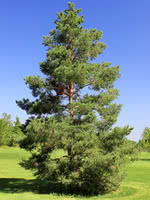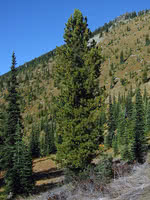Mon-Fri 9am - 5pm Mountain time
Scots Pine (Scotch Pine) vs Whitebark Pine
Pinus sylvestris
Pinus albicaulis
Scots Pine is a hardy, adaptable evergreen. This large tree has an oval crown and distinctively orange bark when mature. Scots Pine prefers dry to average moisture levels with very well-drained soil.
It is the most common pine tree used in shelterbelts and windbreaks. Scots Pine is also occasionally used as a Christmas tree variety.
Endangered
Whitebark Pine is a beautiful coniferous tree that produces tasty, edible nuts. You'll love this trees' rustic and natural appeal, making it an excellent specimen tree.
It is an endangered species from the Rocky Mountains, this slow grower seldom produces cones until it is 50 years old but regularly survives to be 500 or more years of age. Our staff think it is among the most attractive pines we have grown.
Whitebark Pine is well-known for maintaining snow drifts, providing food and shelter to many species of wildlife, and bringing stability to steep slopes. This high elevation and adaptable tree is deer resistant and can withstand a variety of soils and moisture levels.
Scots Pine (Scotch Pine) Quick Facts
Whitebark Pine Quick Facts
In row spacing: 3 - 4 m (10 - 12 ft)

